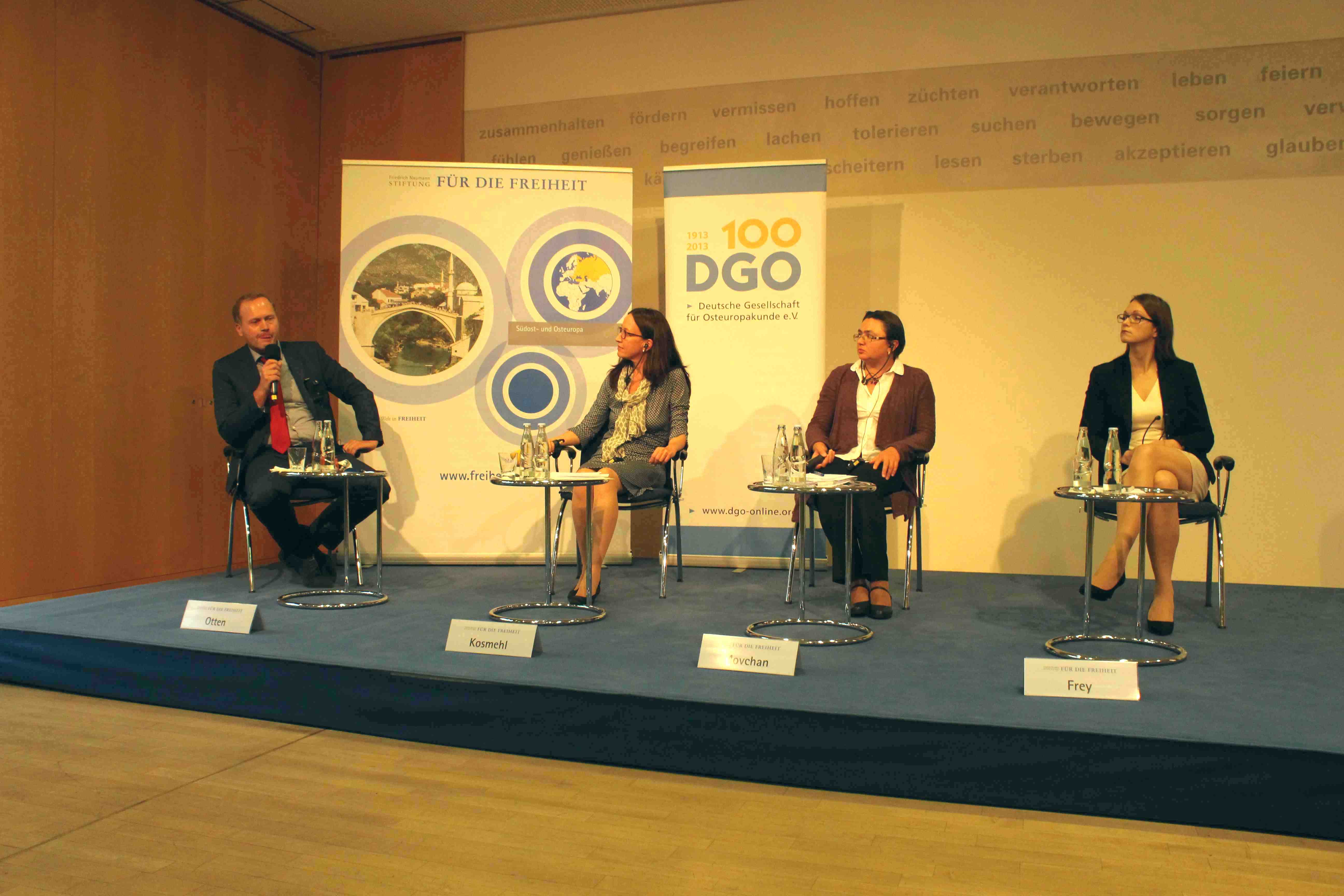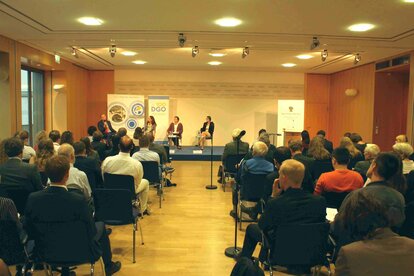Free Trade with Ukraine: Facts, Traps and the Consequences

Photo Credit: Manuel Rommel
A Discussion event on the economic and political consequences of a Free Trade Agreement between Ukraine and the European Union, moderated by the Project Director of FNF for Ukraine and Belarus, Miriam Kosmehl.
On 16 September, the Friedrich Naumann Foundation for Freedom together with the German Society for Eastern European Studies “dgo” invited the public to Berlin to discuss the “Deep and Comprehensive Free Trade Area” (DCFTA) that will come into force as of the 1 January 2016 as an integral part of the Association Agreement between Ukraine and the EU.
About 100 citizens did just that and spent their evening hearing from the panellists why this trade agreement had brought Ukrainians out to the streets en masse in autumn 2013 to protest against then-president Yanukovych, when he had bowed to Kremlin pressure and refused to sign it.
After Ukraine finally did sign its EU Association Agreement in the summer of 2014, almost a year later and under completely different circumstances - Yanukovych having fled to Russia - the issue is now no less controversial with, again, Russia at the centre of events. Moscow claims economic damages as a result of EU sourced products finding their way over its borders via Ukraine and now threatens to retaliate by enacting a trade embargo.
All experts on the panel – Veronika Movchan of the Kyiv Institute for Economic Research and Policy Consulting; Miriam Frey of Regensburg University’s Institute for research on East and South-Eastern Europe; and Thomas Otten, head of an audit and consulting firm in Kyiv – agreed that these were figments of Russian imagination. As Miriam Kosmehl, the director of Friedrich Naumann Foundation’s Kyiv office and moderator of the panel, pointed out in an interview with mdr-radio, that Russia does not have similar claims regarding Serbia and this was not an argument against free trade. Accordingly, all experts stated that it would of course be advantageous for Ukraine to trade freely with both Russia and the EU, but that, unfortunately, Russia itself had insisted that Ukraine be a member of the Eurasian Custom’s Union specifically to restrict Ukraine’s sovereignty in trade.
Altogether, the advantages of the DCFTA far outweigh the risks, i.e., for uncompetitive Ukrainian industrial sectors. It is no surprise that Ukraine has already made adjustments. For example, while exports to Russia fell, Ukraine achieved increases in exports not only to the EU but also to Asia and Africa. Furthermore, while there industrial exports have declined, agricultural exports have risen.

Photo Credit: Manuel Rommel
All experts gave examples on how the DCFTA was a good framework and outlined benchmarks for reforms that Ukraine desperately needs to sustain progress. They also emphasized that Ukraine must reduce excessive bureaucracy and effectively fight corruption, in particular in the judiciary, in order to improve the investment climate.
Thomas Otten speculated about what impact those resources now being zapped by corruption would have if freed up and reinvested in Ukraine’s economy. Veronika Movchan stated that the Deep and Comprehensive Free Trade area with the EU would help leverage these natural resources and build economic success. While reforms are not made easier in the face of armed aggression and economic hardship, today’s Ukrainian decision-makers are spurred on by active and engaged citizens who wish to hold those standing in the way of reform and progress accountable. All panellists agreed that the close cooperation of Ukraine with the European Union under the terms of the Association Agreement would be a welcome foundation for the harmonization of more Ukrainian standards and rules with European regulations and thus a solid foundation for more connections between Ukraine and modern, democratic counterparts.
Miriam Kosmehl, Project Director, FNF Ukraine & Belarus
Photo Credit: Manuel Rommel
For more information visit the website and the Facebook page of FNF Ukraine & Belarus.
The event was part of the global FNF initiative, »Freedom Week 2015«. In the region of East and Southeast Europe there were more than 15 events in 8 cities in 6 offices of the Foundation, all promoting FNF contributions to Freedom.